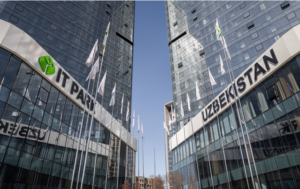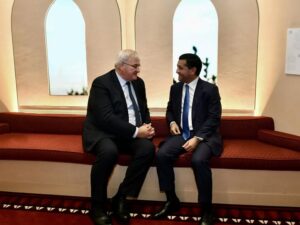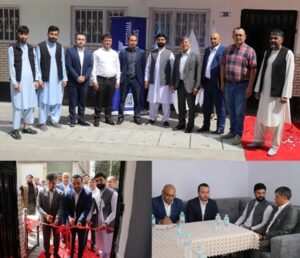
Renowned British journalist and motorsport analyst Joe Sovard, who has been covering the Formula 1 championship since the 1980s, reported on Uzbekistan’s possible interest in hosting a Formula 1 race on its territory.
On the sidelines of the Singapore Grand Prix, which took place at the Marina Bay circuit, representatives of several Asian countries, including Uzbekistan, actively discussed the prospects of organizing future Formula 1 races. This was reported by Joe Sovard, a permanent accredited correspondent for the International Automobile Federation (FIA) and author of the popular blog Joe’s Blog F1, dedicated to the behind-the-scenes aspects of motorsport.
According to Sovard, Uzbekistan is positioning itself as a promising center for the development of international motorsport events in Central Asia. “The paddock at Marina Bay was as lively as ever, and there are rumors that representatives from Thailand, Korea, and even Uzbekistan were discussing possible F1 races in the city in the future,” the expert noted in his recent review. He emphasized that the initiative is in line with Tashkent’s strategic course to modernize infrastructure and strengthen the country’s international image through sport.
Sport is playing an increasingly important role in public life in Uzbekistan. Recently, the national football team qualified for the FIFA World Cup for the first time in history, which gave a significant boost to the development of mass and professional sports.
The government is showing considerable interest in motorsports, undertaking to finance the FIA General Assembly in Tashkent in December this year.
Sovard, whose materials are highly valued in professional circles for their depth of analysis and access to insider information, sees these steps as having the potential to expand the geography of Formula 1. “It is clear that there is interest in cars in the country,” he comments, emphasizing that such initiatives contribute not only to the sporting but also to the economic progress of the region.

The Nikkei Asia news portal reported that the Japanese company Sojitz will invest in the construction of a new international airport in Tashkent.
According to the publication, Sojitz will start implementing the project this year. The construction is part of the company’s $1 billion infrastructure investment.
The Tashkent airport will be built in partnership with the Saudi company Vision Invest on the basis of a public-private partnership. Sojitz plans to invest tens of billions of yen, or hundreds of millions of dollars, in the project. The company has previously participated in international airport projects in Kumamoto and Okinawa prefectures, as well as on the islands of Palau.
“The project for a new airport in Uzbekistan was approved in August 2025. According to the plan, its opening is scheduled for 2028. The new airport will be able to handle up to 20 million passengers per year and provide more than 40 takeoffs and landings per hour, making it the largest in Central Asia,” the article notes.
Sojitz also plans to participate in other infrastructure projects in Uzbekistan. Together with the Turkish company Ronesans International, it plans to build a large 800-bed hospital, a 1 GW wind farm, and a 1.6 GW thermal power plant in Samarkand.
According to Nikkei Asia, Uzbekistan is the largest country in the region with a population of 37 million. Annual GDP growth exceeds 6%, and tax breaks and incentives are available for foreign investors. The corporate tax rate is 15%.
“As of October 2024, 54 Japanese companies are operating in Uzbekistan, twice as many as in 2019. In June, Sojitz opened its first official office in Tashkent,” the publication notes.
The article also notes that other Japanese companies are actively developing infrastructure projects in Uzbekistan. For example, Toyota Tsusho, through its subsidiary Eurus Energy Holdings, is exploring a site for a 500 MW wind farm and has signed an agreement with NEC to build data centers. Marubeni, in partnership with the UAE, is implementing a project to build a wastewater treatment plant.
In addition, Nikkei Asia reports that Uzbekistan is in talks with Japan’s Ministry of Economy, Trade, and Industry to expand cooperation in the extraction of mineral resources, particularly those of strategic importance.

In Uzbekistan, 2,141 positions in the executive branch will be cut by November 1, 2025, due to the introduction of artificial intelligence technologies. The corresponding decree was signed by the country’s president, Shavkat Mirziyoyev, and the document was published in the National Legislation Database.
According to the decree, the largest number of cuts will occur in the State Tax Committee (498 positions), the Ministry of Water Resources (224), the Ministry of Agriculture (200), the Ministry of Justice (197), the Ministry of Ecology (176), and the Ministry of Employment and Poverty Reduction (163).
In addition, the number of deputy heads in state committees, agencies, and inspectorates will be reduced: in some structures, the number of deputies will decrease from 11 to 7, from 12 to 6, and from 13 to 7, respectively.
The Ministry of Employment and the Federation of Trade Unions have been instructed to assist dismissed employees in finding employment and retraining.
The reform is part of a program to digitally transform public administration. In early 2025, President Mirziyoyev signed a law reforming the civil service system, which provides for the introduction of performance evaluations for civil servants and higher requirements for digital skills.
Earlier, Uzbekistan announced the creation of an Artificial Intelligence Development Alliance, which will coordinate the introduction of AI technologies in various industries and allocate funding for infrastructure development. About $100 million is planned to be allocated for these purposes.
The mass reduction of civil servants reflects the authorities’ policy of optimizing the bureaucratic apparatus and improving management efficiency through digitalization. At the same time, experts note that the success of the reform will depend on the quality of the technologies implemented and the state’s ability to provide social protection and retraining for the workers who are being laid off.

The President of Uzbekistan has signed a decree on measures for the digital transformation of public administration and the real sector of the Uzbek economy.
According to the decree, in 2025-2026, it is planned to launch 41 priority projects in the field of Digital Government and increase the share of electronic public services to 70%. To start providing more than 30 types of public services in mahallas and build 66 thousand kilometers of fiber-optic communication lines, commission 2284 base stations and implement more than 100 information systems. Convert more than 100 types of services for households and businesses into electronic format, including proactive and composite services.
Starting from November 1, 2025, mobile operators, banks and payment organizations will be able to provide paid public services through the Single Portal of Interactive Public Services.
Starting December 2025, non-governmental non-profit organizations will also be allowed to engage in interagency electronic interaction.
Starting January 1, 2026, social assistance processes, family and resident data management, and work in mahallas will be transferred to the Digital Mahalla platform.
By the end of 2026, the Cadastre Agency will complete the transfer of all real estate data to the UZKAD system and create a Unified Address Register linked to WGS-84.
By December 1, 2026, the Ministry of Digital Technologies will develop a single digital platform, OASIS, which will provide
The operator will be the Digital Government Project Management Center, funded by the Ministry of Digital Transformation and other sources not prohibited by law.
Starting November 1, startups under the Central Bank’s Digital Startups and Regulatory Sandbox programs will be able to use the Digital Data Platform for free for up to one year.
Foreign specialists who are residents of IT parks will be able to remotely open accounts and virtual cards in Uzbekistan by obtaining a PIN through diplomatic missions.
From January 1, 2026, residents of IT parks will be allowed to

On the sidelines of the UN General Assembly session in New York, Uzbek Foreign Minister Bakhtiyor Saidov met with Ukrainian Foreign Minister Andriy Sibiga.
The parties discussed topical issues of bilateral cooperation, including trade, investment, education and cultural exchange, as well as key aspects of cooperation in multilateral formats within international organizations.
“The meeting confirmed the mutual commitment of Uzbekistan and Ukraine to deepen dialogue, strengthen partnership and develop new opportunities for the benefit of our peoples,” Bakhtiyor Saidov said.
Andriy Sybiga wrote on his page on the social network X that the parties agreed to resume political dialogue and expand bilateral and multilateral cooperation in various fields.
“Ukraine seeks to develop relations with Uzbekistan and strengthen ties with Central Asian countries,” the statement reads.

In Kabul, Uzbekistan and Afghanistan have established a joint venture for freight transportation—Sogdiana Trans LLC.
Sogdiana Trans LLC was founded by O‘zbekiston temir yo‘llari JSC and specializes in freight transportation, management, and technical maintenance of the Khairaton–Mazar-i-Sharif–Noibabad railway line.
At the opening ceremony of the joint venture, Hamid Khan, head of Khan Daqiq Trading, said that the company has the capacity to transport 150,000 tons of products per year by road along the Kabul–Mazar-i-Sharif –
Kabul, as well as from Mazar-i-Sharif by rail to Uzbekistan, Kazakhstan, the Baltic countries, and others, and to import products from there.
During the event, the head of the logistics and marketing department of Sogdiana Trans LLC expressed his gratitude to the President of Uzbekistan Shavkat Mirziyoyev and the management of O‘zbekiston temir yo‘llari JSC for the opportunities created for entrepreneurs in the Year of Environmental Protection and Green Economy.
AFGHANISTAN, CARGO, joint venture, TRANSPORTATION, UZBEKISTAN